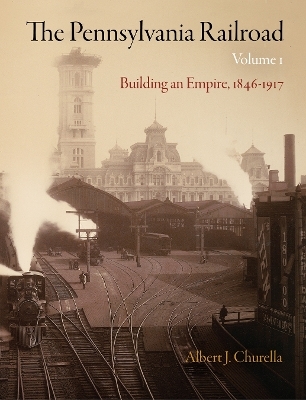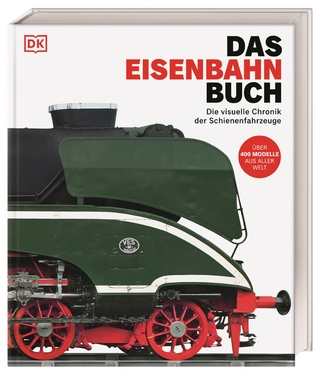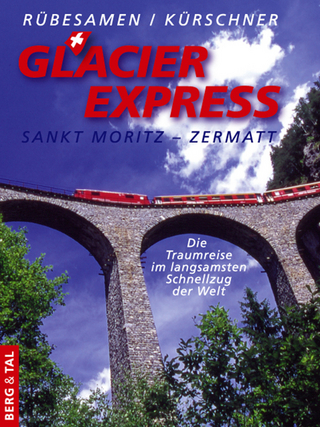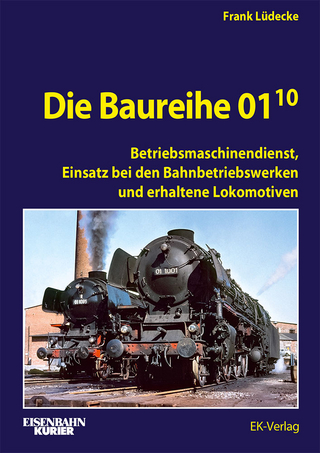
The Pennsylvania Railroad, Volume 1
Building an Empire, 1846-1917
Seiten
2012
University of Pennsylvania Press (Verlag)
978-0-8122-4348-2 (ISBN)
University of Pennsylvania Press (Verlag)
978-0-8122-4348-2 (ISBN)
Albert J. Churella chronicles the history of the Pennsylvania Railroad within the context of social, economic, and technological changes of nineteenth- and twentieth-century America. The story of the PRR illuminates broad themes in U.S. history, including labor relations, the relationship between business and government, and technological advances.
"Do not think of the Pennsylvania Railroad as a business enterprise," Forbes magazine informed its readers in May 1936. "Think of it as a nation." At the end of the nineteenth century, the Pennsylvania Railroad was the largest privately owned business corporation in the world. In 1914, the PRR employed more than two hundred thousand people—more than double the number of soldiers in the United States Army. As the self-proclaimed "Standard Railroad of the World," this colossal corporate body underwrote American industrial expansion and shaped the economic, political, and social environment of the United States. In turn, the PRR was fundamentally shaped by the American landscape, adapting to geography as well as shifts in competitive economics and public policy. Albert J. Churella's masterful account, certain to become the authoritative history of the Pennsylvania Railroad, illuminates broad themes in American history, from the development of managerial practices and labor relations to the relationship between business and government to advances in technology and transportation.
Churella situates exhaustive archival research on the Pennsylvania Railroad within the social, economic, and technological changes of nineteenth- and twentieth-century America, chronicling the epic history of the PRR intertwined with that of a developing nation. This first volume opens with the development of the Main Line of Public Works, devised by Pennsylvanians in the 1820s to compete with the Erie Canal. Though a public rather than a private enterprise, the Main Line foreshadowed the establishment of the Pennsylvania Railroad in 1846. Over the next decades, as the nation weathered the Civil War, industrial expansion, and labor unrest, the PRR expanded despite competition with rival railroads and disputes with such figures as Andrew Carnegie and John D. Rockefeller. The dawn of the twentieth century brought a measure of stability to the railroad industry, enabling the creation of such architectural monuments as Pennsylvania Station in New York City. The volume closes at the threshold of American involvement in World War I, as the strategies that PRR executives had perfected in previous decades proved less effective at guiding the company through increasingly tumultuous economic and political waters.
"Do not think of the Pennsylvania Railroad as a business enterprise," Forbes magazine informed its readers in May 1936. "Think of it as a nation." At the end of the nineteenth century, the Pennsylvania Railroad was the largest privately owned business corporation in the world. In 1914, the PRR employed more than two hundred thousand people—more than double the number of soldiers in the United States Army. As the self-proclaimed "Standard Railroad of the World," this colossal corporate body underwrote American industrial expansion and shaped the economic, political, and social environment of the United States. In turn, the PRR was fundamentally shaped by the American landscape, adapting to geography as well as shifts in competitive economics and public policy. Albert J. Churella's masterful account, certain to become the authoritative history of the Pennsylvania Railroad, illuminates broad themes in American history, from the development of managerial practices and labor relations to the relationship between business and government to advances in technology and transportation.
Churella situates exhaustive archival research on the Pennsylvania Railroad within the social, economic, and technological changes of nineteenth- and twentieth-century America, chronicling the epic history of the PRR intertwined with that of a developing nation. This first volume opens with the development of the Main Line of Public Works, devised by Pennsylvanians in the 1820s to compete with the Erie Canal. Though a public rather than a private enterprise, the Main Line foreshadowed the establishment of the Pennsylvania Railroad in 1846. Over the next decades, as the nation weathered the Civil War, industrial expansion, and labor unrest, the PRR expanded despite competition with rival railroads and disputes with such figures as Andrew Carnegie and John D. Rockefeller. The dawn of the twentieth century brought a measure of stability to the railroad industry, enabling the creation of such architectural monuments as Pennsylvania Station in New York City. The volume closes at the threshold of American involvement in World War I, as the strategies that PRR executives had perfected in previous decades proved less effective at guiding the company through increasingly tumultuous economic and political waters.
Albert J. Churella is Associate Professor in the Social and International Studies Department at Southern Polytechnic State University.
Introduction
List of Abbreviations
Chapter 1. The Way West, 1682-1826
Chapter 2. Commonwealth, 1826-1846
Chapter 3. Community, 1846
Chapter 4. Enterprise, 1846-1852
Chapter 5. Executive, 1852-1857
Chapter 6. Coordination, 1857-1860
Chapter 7. Expansion, 1850-1868
Chapter 8. Conflict, 1860-1868
Chapter 9. Empire, 1868-1876
Chapter 10. Connections, 1865-1873
Chapter 11. Limits, 1874-1877
Chapter 12. Order, 1877-1899
Chapter 13. System, 1889-1929
Chapter 14. Regulation, 1899-1910
Chapter 15. Terminus, 1917
Notes
Index
Acknowledgments
| Reihe/Serie | American Business, Politics, and Society |
|---|---|
| Zusatzinfo | 92 illus. |
| Verlagsort | Pennsylvania |
| Sprache | englisch |
| Maße | 216 x 279 mm |
| Themenwelt | Natur / Technik ► Fahrzeuge / Flugzeuge / Schiffe ► Schienenfahrzeuge |
| Technik | |
| ISBN-10 | 0-8122-4348-X / 081224348X |
| ISBN-13 | 978-0-8122-4348-2 / 9780812243482 |
| Zustand | Neuware |
| Haben Sie eine Frage zum Produkt? |
Mehr entdecken
aus dem Bereich
aus dem Bereich
die visuelle Chronik der Schienenfahrzeuge
Buch | Hardcover (2024)
DK Verlag Dorling Kindersley
34,95 €
St. Moritz – Zermatt : die Traumreise im langsamsten Schnellzug der …
Buch | Hardcover (2023)
Verlag Berg & Tal
14,95 €
Betriebsmaschinendienst, Einsatz bei den Bahnbetriebswerken und …
Buch | Hardcover (2024)
EK-Verlag
54,00 €


